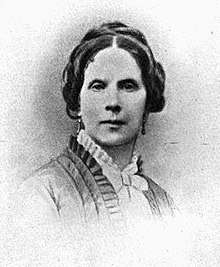Margaret Junkin Preston
Margaret Junkin Preston (May 19, 1820 – March 28, 1897)[1] was an American poet and author.[2]
Margaret Junkin Preston | |
|---|---|
 | |
| Born | May 19, 1820 Milton, Pennsylvania, U.S. |
| Died | March 28, 1897 (aged 76) Baltimore, Maryland, U.S. |
| Resting place | Stonewall Jackson Memorial Cemetery, Lexington, Virginia |
| Occupation | Poet, author |
| Spouse(s) | John Thomas Lewis Preston (1857–1890; his death) |
| Parent(s) | George Junkin Julia Rush (Miller) Junkin |
| Relatives | Elinor Jackson (sister) |
Biography
She was born in Milton, Pennsylvania, in 1820.[3][4] Her father was George Junkin, a Presbyterian minister and college president.[2][3][4][5][6] She learned Latin and Ancient Greek at the age of twelve.[3] She married Major John Thomas Lewis Preston in 1857,[7] a professor of Latin at Virginia Military Institute.[2][3][4][5][6] Her sister, Elinor (Ellie), had in 1853 married Thomas "Stonewall" Jackson, a colleague of Preston's at VMI.[8] Major Preston served on the staff of Stonewall Jackson during the Civil War.[9]
She wrote many volumes of prose and poetry, and published some of her writing in the Southern Literary Messenger and Graham's Magazine.[10] She also published a few articles in Harper's Magazine.[11] Preston's 1856 novel Silverwood is a subtle exploration of the clash between traditional values of honor and family and the new market economy that was sweeping through the United States and the Shenandoah Valley.[12] She is remembered for espousing the Confederacy in her poems,[6] and she was known informally as the Poet Laureate of the Confederacy.[13]
She became blind in the late 1880s, and died in Baltimore in 1897.[3][5]
Bibliography
- Silverwood, a Book of Memories (1856) at Internet Archive
- Beechenbrook: A Rhyme of War (1865)
- Old Song and New (1870)
- Cartoons (1875)
- Centennial Poem for Washington and Lee University: Lexington, Virginia, 1775–1885 (1885)
- A Handful of Monographs: Continental and English (1886)
- For Love's Sake: Poems of Faith and Comfort (1886)
- Colonial Ballads, Sonnets and Other Verse (1887)
- Semi-Centennial Ode for the Virginia Military Institute: Lexington, Virginia, 1839–1889 (1889)
- Aunt Dorothy: An Old Virginia Plantation Story (1890)
References
- "Pr – New General Catalog of Old Books & Authors". Retrieved December 14, 2016.
- "Margaret Junkin Preston Papers, 1812–1892, 1938, 1997". Retrieved December 14, 2016.
- Southern Writers: A Biographical Dictionary (Southern Literary Studies), Robert Bain (ed.), Jr. Louis D. Rubin (ed.), Joseph M. Flora (ed.), Louisiana State University Press, 1979, pp.365–366
- Southern Life in Southern Literature, Maurice Garland Fulton (ed.), Kessinger Publishing, 2003, p. 268
- Charles William Hubner, Representative Southern Poets, BiblioLife, 2008, p. 147
- "Margaret Junkin Preston, Poet of the Confederacy". Retrieved December 14, 2016.
- "Margaret Junkin Preston (1820–1897) – Poetess Laureate of the South". Retrieved December 14, 2016.
- "Eleanor Junkin (1825–1854) – first wife of Confederate General Thomas "Stonewall" Jackson". Retrieved December 14, 2016.
- http://www.lib.unc.edu/mss/inv/p/Preston,Margaret_Junkin.html
- "History Cooperative – A Short History of Nearly Everything!". Archived from the original on June 30, 2008. Retrieved December 14, 2016.
- "Margaret Junkin Preston – Harper's Magazine". Retrieved December 14, 2016.
- Alfred L. Brophy & Douglas Thie, Land, Slaves, and Bonds: Probate in the Pre-Civil War Shenandoah Valley, West Virginia Law Review 116 (2016): 345, 348–50 (beginning exploration of trust law in the Shenandoah Valley with the central conflict in Silverwood – a trustee's stealing of the inheritance of the Irvine family).
- Virginia is for Lovers (i.e., Virginia Tourism Corporation). "Stonewall Jackson Memorial Cemetery". Retrieved September 17, 2017.
External links
| Wikisource has original works written by or about: Margaret Junkin Preston |